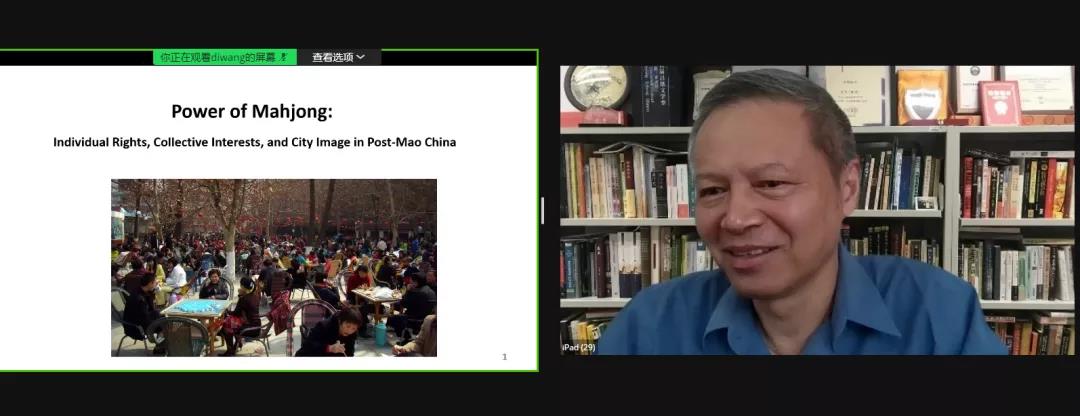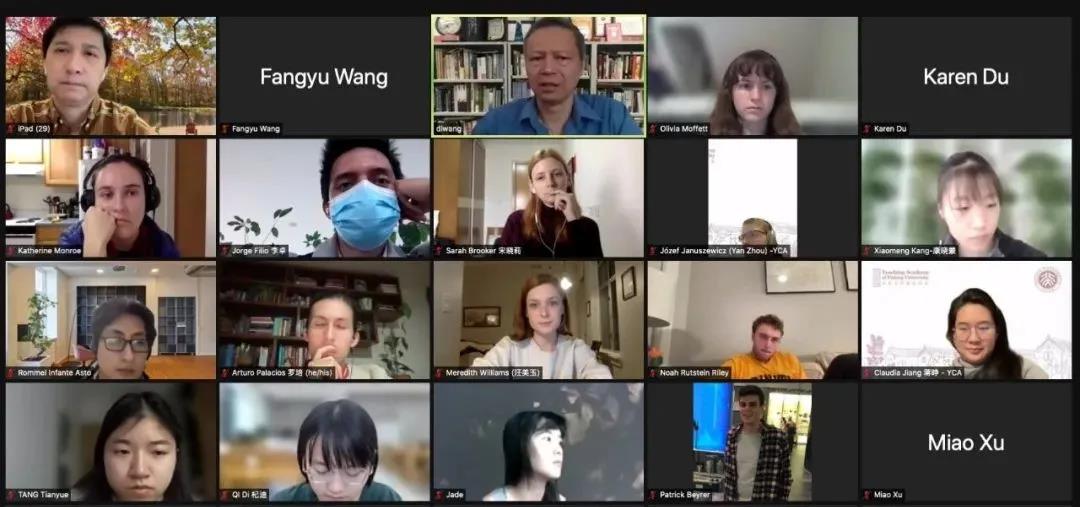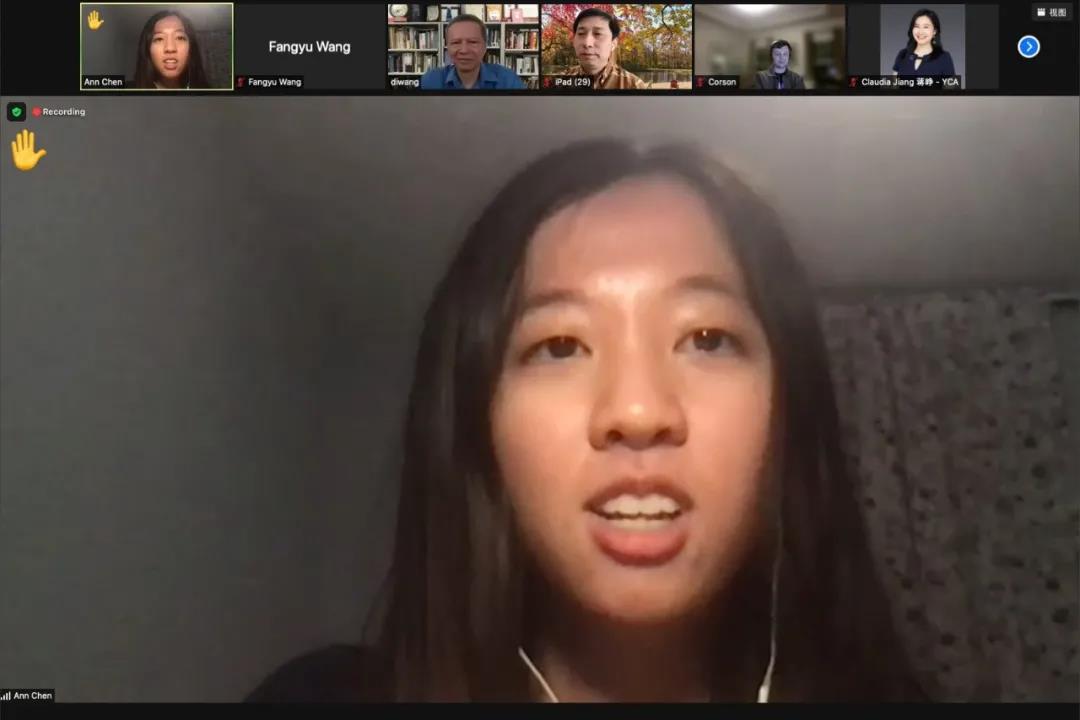On November 4, Professor Wang Di from the Department of History, University of Macau, gave a lecture titled “Power of Mahjong: Individual Rights, Collective Interests, and City Image in Post-Mao China” at the Yenching Academy. It was the third lecture in the 2021–22 academic year’s Topics in China Studies Lecture Series and was chaired by Professor Lu Yang, Director of Graduate Studies at YCA.
After the lecture, Prof. Wang Di sat for an interview, talking about his research on teahouses and mahjong-playing. The study of history in China has, according to him, focused on big issues, as Sima Qian, the grand historian of the Han dynasty, put it, “to investigate the relationship between Heaven and humans and understand historical changes.” Nonetheless, Prof. Wang thought it necessary to focus on ordinary people, who comprise 95% of the Chinese population. He believes individuals deserve more attention from historians. An individual may have little impact on history, but individuals who share the same ideas and life philosophies can be pacesetters. Teahouse-goers are sticking to a traditional lifestyle and culture; we grasp the popular culture and delve deeper into daily routines by evaluating them.
Prof. Wang observed changes the old-style teahouses are undergoing, as Western culture and Wanghong economy or Internet celebrity economy intermingle modern China. He found that young people prefer new public spaces and service facilities like cafes and pubs, and teahouse business naturally comes under pressure, as seen in Chengdu and other big cities like Beijing and Shanghai. According to Prof. Wang, we must see correctly and accept any changes brought by new things. Nevertheless, he did not think teahouses would die out in the foreseeable future. Instead, the professor saw a possibility where teahouses remain in business, operating new models and serving new customers.
Prof. Wang recalled his studying years. Before he left Chengdu for the United States in 1991, he had completed Striding out of a Closed World, a book studying the society of Sichuan. Chengdu was not a focus of his study at the time, though. He had budding thoughts for the city but could not bring himself to pen them, perhaps, because he was part of the city and too close to it. When he traveled to the US, he felt his experiences of Chengdu and Chinese culture become clearer, having distanced himself from the city. Prof. Wang remarked that one might see things better once they stand afar. Chengdu became his research focus in the US, and studying the city has remained his life-long career focus, even though he does not live there. Prof. Wang believes this distance enables him to discover the city anew in his research.
At the end of the interview, Prof. Wang Di encouraged our Yenching Scholars to see beyond their fields of study and take a broader, interdisciplinary perspective. He recommended extensive reading of and learning from all sorts of theories and methodologies.

On the Lecture
Prof. Wang first talked about a lawsuit relating to mahjong-playing in October 2000. A young woman called Yu lived in a residential complex in Chengdu. Her apartment was on the second floor, right above the Activity Room run by the Residential Committee. Yu found it impossible to sleep due to the noise by mahjong players in the Activity Room, both day and night. She fell victim to neurasthenia. Yu complained to the Residential Committee and even called the police several times, but the problem persisted. The Residential Committee called for a vote on the issue, where an absolute majority of the residents voted for continued mahjong-playing. Prof. Wang observed that Yu’s action violated the long-standing principle in China that “personal interest should be sacrificed for collective interests,” adding that such action, perhaps, resulted from the rising awareness of individual rights that challenged the conventional perception. Yu sued the Residential Committee, claiming that the noise from the Activity Room had seriously undermined her health. The Residential Committee was in a dilemma: It violated socialist morality by providing a facility for mahjong, but on the other hand, by doing so, it accomplished the Committee’s official mission of enriching its residents’ leisure hours.

Next, Prof. Wang talked about the government’s control over mahjong-playing. As the country prioritized economic development in 1978, mahjong became China's most popular pastime game. The situation is known as the “craze of mahjong-playing,” which caused many conflicts. Negative news relating to mahjong has not been uncommon. The game resulted in fights between players, including officials and doctors, who played during working hours. Media coverage was a part of the official discourse against mahjong. However, the government never banned the game itself, only restricting it to specific groups of people at certain places and times.
The lawsuit had broader implications for the public as it inspired people to consider how society should balance collective interests and individual rights. A CCTV program, “Telling the Truth” (Shihua Shishuo), had an episode on the case. Many audiences saw honest communication of concerns as a better way to settle the dispute. Lady Yu was later forced to move to a new place, even though she won the case in court. But is she the winner, in this sense? Does mahjong-playing make Chengdu’s image a negative one? In 2000, the Committee of Millennium Token in Chengdu surveyed the token of Chengdu. Fifty-five percent of the voters voted for mahjong and only 25% for the giant panda. Prof. Wang pointed out that the survey result indicated the residents’ favorable view of mahjong, the city’s brand for slow-paced Chengdu.
At the end of his lecture, Prof. Wang clarified that the “craze of mahjong-playing” has never been unique to Chengdu. It is a nationwide phenomenon. The lawsuit, Yu’s life after it, and specific issues arising from mahjong must be seen in China's political, social, and cultural contexts.
